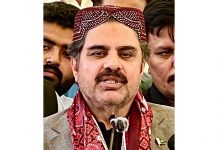United Nations, June 14 (TNS): In a major development, the United Nations Human Rights Office has called for a probe into human rights violations in Indian occupied Kashmir.
The Office of the United Nations High Commissioner for Human Rights (OHCHR) on Thursday said that it was not given full access to the area for a detailed investigation.
The report states that shortly after protests broke out after the killing of Hizbul Mujahideen commander Burhan Wani in July, 2016, the High Commissioner of Human Rights Zeid Ra’ad al-Hussein met officials from both Pakistan and India and the two sides had two different versions of the situation.
Hussein’s report further stated that both countries were asked for unconditional access to Kashmir. India rejected the request while Pakistan said that the office of the High Commissioner would be given access to Pakistan-administered Kashmir only if the latter obtained access to the Indian side as well.
When the request for full access was rejected, OHCHR undertook remote monitoring of human rights violations. The report stated that the conclusions were based on information that was available on public domain, including some information that was obtained by the Right to Information Act.
The OHCHR said that special laws in place like AFSPA and the Jammu and Kashmir Public Safety Act created structures that obstructed the normal course of law, impede accountability and jeopardize the right to remedy for victims of human rights violations.
“Section 7 of AFSPA 1990 prohibits the prosecution of security forces personnel unless the Government of India grants a prior permission or “sanction” to prosecute. This gives security forces virtual immunity against prosecution for any human rights violation. In the nearly 28 years that the law has been in force in Jammu and Kashmir, there has not been a single prosecution of armed forces personnel granted by the central government,” the report said, adding that despite Supreme Court order to probe extra judicial killings in Manipur, there had been no such initiative in Kashmir.
“PSA has reportedly been widely used by the authorities in J&K to stifle dissent. It has been used to target human rights defenders, 75 journalists, separatist76 political leaders, suspected members of armed opposition groups and people involved in protests,” the report further said, adding that during the 2016 unrest, several minor were detained under PSA, despite the Act having been amended to exclude minors from it.
The report also slams India for using pellet guns and also condemns the “arbitrary detentions and arrests”.
“As a State party to the International Covenant on Civil and Political Rights, which prohibits torture under any circumstances (Article 7), India is obliged to ensure that no person is “subjected to torture or to cruel, inhuman or degrading treatment or punishment”. There have long been persistent claims of torture by security forces in Kashmir,” Hussein said in his report, mentioning the incident of Farooq Dar being strapped to an Army vehicle.
Hussein’s report also states that enforced disappearances continue in the valley and slams the terrible state of law and order, which was evident from “the Kunan-Poshpora mass rape, which took place 27 years ago and for which attempts to seek justice have been denied and blocked over the years by the authorities at different levels.”
On Pakistan, the OHCHR said that there was rampant misuse of Pakistan’s anti-terrorism Act against young activists and that there was violation of land rights, restrictions on freedom of religion and belief.
The OHCHR said that there needs to be an urgent need for meaningful dialogue that includes people of Kashmir. “Consider the findings of this report, including the possible establishment of a commission of inquiry to conduct a comprehensive independent international investigation into allegations of human rights violations in Kashmir,” Hussein’s report states.
It also asked India to repeal AFSPA and to establish impartial and credible investigations to probe all civilian killings.
“Investigate all deaths that have occurred in the context of security operations in Jammu and Kashmir following the guidelines laid down by the Supreme Court of India…Bring into compliance with international human rights standards all Indian laws and standard operating procedures relating to the use of force by law enforcement and security entities, particularly the use of firearms: immediately order the end of the use of pellet-firing shotguns in Jammu and Kashmir for the purpose of crowd control,” Hussein said.
It asked Pakistan to immediately release “from prison or house arrest any political activists, journalists and other civil society actors who have been convicted for peacefully expressing their opinions.”
“End the misuse of anti-terror legislation to persecute those engaging in peaceful political and civil activities and expressions of dissent, and amend the Anti-Terrorism Act to bring it in line with international human rights standards, including by incorporating human rights safeguards,” the report further said.















